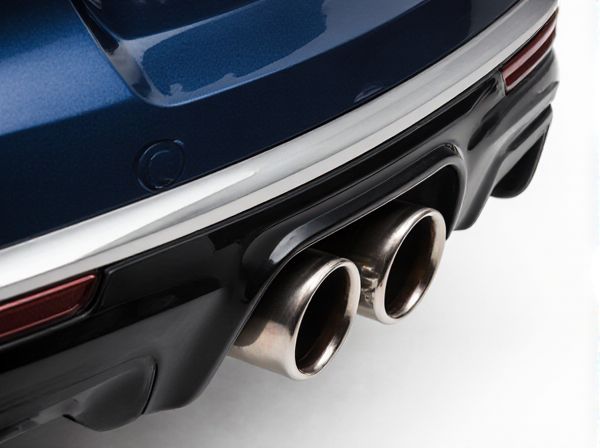
Photo illustration: Resonator vs Muffler
A resonator primarily reduces specific sound frequencies in your vehicle's exhaust system, enhancing the engine's tone without significantly affecting performance. A muffler focuses on overall noise reduction by using various chambers and perforated tubes to minimize exhaust sound levels. Your choice depends on whether you prioritize sound refinement or noise suppression for a quieter ride.
Table of Comparison
| Feature | Resonator | Muffler |
|---|---|---|
| Primary Function | Reduces specific sound frequencies to refine exhaust tone | Significantly reduces overall exhaust noise |
| Sound Impact | Creates smoother, less harsh engine sound | Deepens and quiets exhaust noise substantially |
| Location in Exhaust System | Located before or after the muffler | Usually positioned after the catalytic converter |
| Noise Reduction Level | Moderate noise dampening | High noise reduction efficiency |
| Performance Impact | Minimal to no impact on engine performance | May slightly restrict exhaust flow, possible minor performance effect |
| Typical Use | Fine-tuning exhaust sound in performance vehicles | Standard component in most vehicles for noise compliance |
Introduction to Resonators and Mufflers
Resonators and mufflers are vital components in automotive exhaust systems designed to control sound emissions. Resonators modify exhaust tones by canceling specific sound frequencies through engineered chambers, enhancing engine sound quality. Mufflers reduce overall noise by dissipating exhaust gas energy with baffles or perforated tubes, ensuring compliance with sound regulations.
Purpose and Function of a Resonator
A resonator primarily serves to enhance the sound quality of a vehicle's exhaust system by reducing specific sound frequencies and smoothing exhaust noise. Unlike a muffler, which focuses on significantly dampening overall exhaust noise to comply with sound regulations, the resonator fine-tunes the sound to create a more pleasant and refined tone. Its function involves redirecting sound waves and canceling out certain frequencies, contributing to improved exhaust flow and reduced engine noise without the bulk of a traditional muffler.
Purpose and Function of a Muffler
A muffler is designed to reduce the noise produced by the engine's exhaust gases through a series of chambers and perforated tubes that dissipate sound waves. Unlike a resonator, which primarily tunes the exhaust sound and improves airflow, a muffler focuses on minimizing noise pollution and maintaining a quieter vehicle operation. Its construction helps control exhaust backpressure, ensuring optimal engine performance and compliance with noise regulations.
Key Differences Between Resonators and Mufflers
Resonators primarily reduce specific sound frequencies to alter exhaust tone without significantly restricting airflow, while mufflers focus on minimizing overall exhaust noise through sound absorption and reflection techniques. Resonators tend to enhance engine performance by maintaining smoother exhaust flow, whereas mufflers can create more back pressure, potentially affecting horsepower. The key difference lies in their function: resonators fine-tune exhaust sound quality, and mufflers provide comprehensive noise suppression for quieter vehicle operation.
Impact on Exhaust Sound: Resonator vs. Muffler
A resonator primarily modifies exhaust sound by smoothing and reducing drone frequencies, resulting in a refined and quiet tone without significant volume reduction. In contrast, a muffler drastically lowers overall exhaust noise by dissipating sound waves through chambers and perforated tubes, producing a much quieter and muffled effect. Choosing between a resonator and muffler depends on desired sound characteristics: resonators enhance sound quality while mufflers reduce noise levels drastically.
Performance Effects: Power, Efficiency, and Flow
Resonators enhance exhaust flow by reducing drone and stabilizing sound waves without significantly restricting airflow, which can slightly improve engine efficiency and power output. Mufflers primarily focus on noise reduction by dissipating exhaust pressure, often creating backpressure that can reduce engine performance and throttle response. Optimizing exhaust systems with high-flow resonators or performance mufflers balances power gains, fuel efficiency, and sound quality.
Noise Reduction Capabilities Compared
Resonators primarily target specific sound frequencies by canceling out certain noise waves, effectively reducing droning and improving exhaust tone without significantly impacting overall loudness. Mufflers, equipped with chambers and baffles, provide broader noise reduction by dissipating sound energy and controlling exhaust flow, resulting in a quieter and more muted engine sound. When comparing noise reduction capabilities, mufflers offer more comprehensive sound suppression, whereas resonators fine-tune exhaust tone and reduce targeted frequencies.
Common Applications: When to Use Each Component
Resonators are commonly used in performance vehicles to enhance exhaust sound quality and reduce drone without significantly restricting airflow, making them ideal for aftermarket upgrades and sports cars. Mufflers are essential in passenger vehicles and trucks to minimize noise pollution and comply with legal noise limits while maintaining engine efficiency. Use resonators when seeking a balance between sound refinement and performance, and choose mufflers for effective noise reduction and quieter operation in everyday driving.
Installation and Maintenance Considerations
Resonators typically require simpler installation processes due to their smaller size and fewer internal components, making them easier to fit into existing exhaust systems. Mufflers, with more complex internal chambers designed to reduce noise, often demand precise alignment and secure mounting to prevent rattling or leaks. Maintenance for resonators is usually minimal since they lack moving parts, whereas mufflers may need periodic inspection for corrosion and damage due to constant exposure to exhaust gases and moisture.
Choosing Between a Resonator and a Muffler
Choosing between a resonator and a muffler depends on your desired sound and performance outcomes. Resonators primarily reduce drone and modify exhaust tone without significantly affecting backpressure, making them ideal for enhancing engine efficiency. Mufflers are designed to minimize noise by damping exhaust sound waves, often resulting in quieter operation but potentially impacting engine output due to increased backpressure.
 caratoz.com
caratoz.com